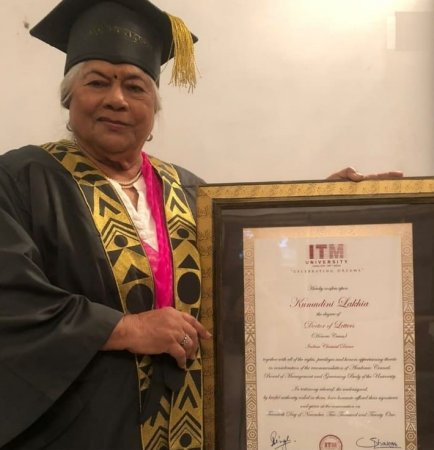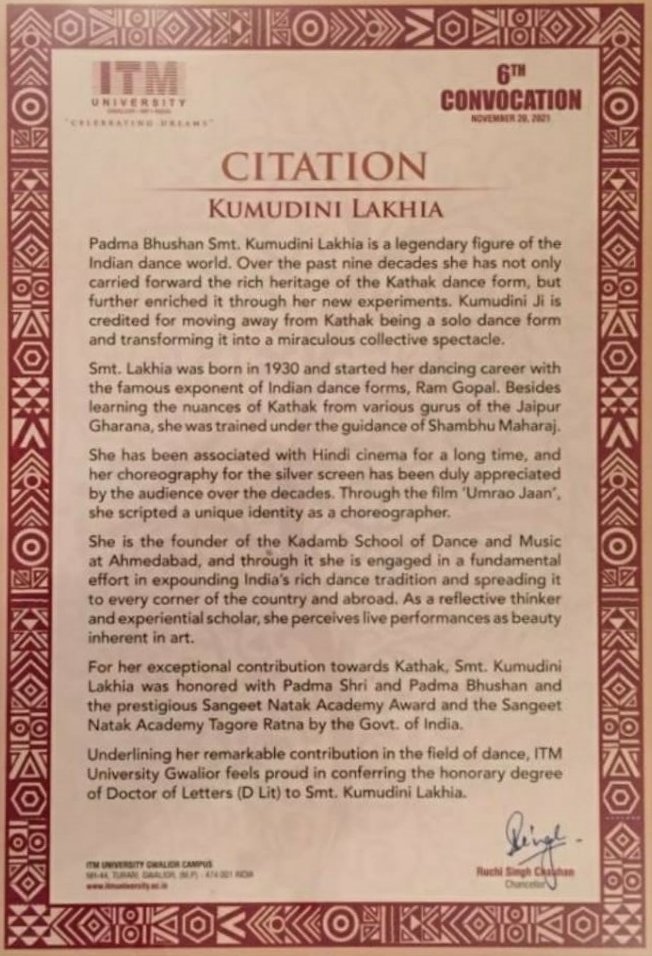
|   |

|   |
 e-mail: arshiyasethi@gmail.com An Honorary Degree for Kumudini Lakhia: An opportunity for us to think of how hard work leads to honour, which begets honour November 27, 2021 Let us talk today about honorary degrees given to artistes. This is not coming from the discourse in the country about dubious degrees, misleading titles, and unheard-of domains of study. Instead, it comes from the fact that Padma Bhushan recipient, Kumudini Lakhia, the grande dame of Kathak, the senior most Kathak dancer and one of the most highly decorated artistes of the country, was awarded an Honorary degree, of Doctor of Letters (D. Litt.), by the ITM University, Gwalior, on 20th November 2021, on the occasion of its 6th convocation. I am so happy to be concluding the Soch column for this year, an annus horribilis in many ways, with a positive story. ITM is a private University that has honoured distinguished personalities in the past too - since 2016. Among them are a mixed bag of journalists, sports persons, activists, media personalities, and arts icons, numbering almost forty in these six years. With this recognition, Kumiben has joined the ranks of arts icons like music maestros Dr. L. Subramanyam and Pt. Ajay Chakraborty, renowned artists like Prabhakar Kolte, Krishan Khanna and Arpita Singh, poets like Ashok Vajpeyi, film makers like Shyam Benegal and Govind Nihalani, actors like Naseeruddin Shah, and in dance Pt. Birju Maharaj. These are all past awardees from the arts. It is remarkable that a university that is primarily a Technology and Management University has seen such value in the arts. They have nothing to gain in their main business of education by honouring people from diverse fields and so many from the arts. What does it tell us of the position the arts enjoy in the hearts and minds of those who may not have ever intersected with it, learnt it or even consumed it? India is a 'Rasa-mayee' society at heart, and this valorization should be a source of great reassurance to the artistic community that went through an unprecedentedly lean period during the pandemic.  Kumudini Lakhia This year Lakhia's fellow awardees are artist Arpita Singh, musician Ashwini Bhide, and actor Sharmila Tagore. Together with Kumudini Lakhia they constituted 50% of those selected this year to get honorary degrees from this University. Interestingly, the University does not have an arts department, which only speaks highly of how this university has understood the soft power of the arts and a unique ability that Picasso recognized. "Art washes from the soul the dust of everyday life", is what he had said. Kudos to this University that recognises that the arts alone make up at least 50% of who we are! Congratulations to Kumiben and to all the other awardees. It is indeed true that in honouring such luminaries the University brings honour to itself too! An Honorary degree is in effect higher education's most prestigious award, the highest award that a university or any other such degree granting institute offers. It is a recognition reserved for individuals with national and international reputations. It is not something that one consciously labours over, like regular doctoral students working hard, trawling libraries and burning the midnight oil. This is the other ways of earning a doctorate. I hesitate to say that it is an easier way, for it comes to you only in recognition of an impressive body of lifetime work, for the benefit of the field and the people. It is something you are selected for, as an honour, and hence the degree is called 'honoris causa' - for the sake of honour, or 'ad honoram'- to the honour. While not being regular degrees, they do not entitle the recipient to the same professional privileges as those individuals who have earned their degrees by writing robust dissertations that they have vigorously defended. Of course, some Universities have been criticised for awarding people least deserving of this honour and some have actually had the honour withdrawn due to bringing down the honour of the university. For instance, Bill Cosby had received 50 honoris causa degrees. All of them were revoked when the molestation and sexual harassment allegations broke. Similarly, the Edith Cowan University in Western Australia rescinded the honorary doctorate that they had awarded to actor, entertainer, media personality Rolf Haris when he was convicted of sex offences in 2014. The University of Edinburgh and the University of Massachusetts, Amherst, rescinded the degrees they had awarded to Robert Mugabe for human rights violations. Some of the honorary degrees awarded to Mr. Trump were also rescinded once the news broke in a book written by his niece Mary Trump that the former President had used a surrogate to write his SAT exams! In 1985, as a deliberate snub to the then Prime Minister of UK, Margaret Thatcher, due to her cuts to hi9gher education the University of Oxford broke with tradition and for the first time did not so honour a PM who had studied in its halls! Closer home, Ravenshaw College revoked its decision to honour a honoris causa degree to business honcho and media baron Shobhana Bhartia due to controversies within the selection committee. This is the reason why such decisions are kept close to the chest and announced only at a final stage. Ravenshaw revokes decision to confer honoris causa on business honcho But in 2017 we had an unusual case of Rahul Dravid rejecting an honorary doctorate offered by the Bangalore University, claiming that he would rather like to earn the degree through some sports based research at some point of time. Recently, in India, there was the pay for honorary degrees scandal. It took into its ambit, politicians, often poorly educated to begin with, social personalities and also artistes. Many of the universities that dealt out degrees for cash - Rs. 20,000 was the starting figure - often made lakhs of rupees even after the pomp and pelf at the bestowing ceremony was accounted for. Many of these universities were found to be not existent or fly by night operators, although they had flowery citations and fancy crests printed on the degrees. Some well known universities have been criticised for linking degree giving to large donations. Some cynics may feel that this is in effect a PR exercise by a university, or a way of ensuring a great commemoration speaker that day, but the world of academia is strong on ethics and aberrations usually get called out. The world of internet and social media no longer allow such misdemeanours to remain hidden. Student protests don't bother about inflated egos. Of course, you know when the degree is a sham and when it is not. When the track record of the recipient is golden and a proper process is followed, of nominations by one committee and selections by another, one usually has a winner in hand. However, when I look at some lists, while impressed with the work trajectory of all recipients, I wish that a more robust due diligence was followed so that ethical issues were also looked at while making selections. Honorary degrees were initiated in the Middle Ages, in Oxford and Cambridge, with most honours going to visiting royalty and important members of the entourage. Some New World Universities like Stanford, MIT and Cornell do not offer honorary degrees as a matter of principle. The University of Virginia abides by its founder, Thomas Jefferson's advice to refrain from giving such honorary degrees. Maybe it's time now to look a little bit at protocols that come with honorary degrees. For one, an honorary degree, gives you the right to include it in your CV, not as an educational qualification, but in the section for awards, with the letters (Hon. Causa) in parenthesis. After all, while the degree came your way as an award, all educational and academic requirements were waived! In fact, the recipient and the university may be a complete stranger to it, and need not ever have been associated in the past. There is no need at all for ever being enrolled in it. Kumiben mentioned to me that she did not know about this university before this honour was announced. After the degree has been accepted, the granting University may address the recipient as 'Doctor', as per tradition the recipient cannot refer to self as doctor, nor use the honorific in a visiting card - unless it is used at the end of the name as D.Litt (Hon. Causa), letterhead, seat placement or verbal introduction. I have seen many aberrations on this count in India, including in the arts. But they can always cite the example of some well-known global mavericks. Memoirist and poet Maya Angelou, who had no earned degrees, but was a recipient of dozens of honorary ones, she preferred people, other than family and close friends, to call her "Dr. Angelou". Benjamin Franklin had also received two honorary doctorates, from University of St. Andrews and Oxford, preferred to call himself "Doctor Franklin". The case of Alan Garcia, the former President of Peru, who had not finished his doctoral research, liked the sound of the honorific very much and began using it. He came under attack by the media when this fact was discovered. He was eventually bailed out by the University of Delhi that awarded him an honorary doctorate, when he visited India in 1987. He now had some locus standii to pass himself off as "Doctor Garcia".  Citation For long, I had been wanting to write about the rights and responsibilities of honorary doctorates. Kumudini Lakhia's honorary degree has provided the opportunity and it has in no way taken away I hope from the absolute honour it is for the arts, the field of dance, the style of Kathak and all dancers, especially women dancers, for all of whom Kumiben remains a glorious icon. I attach two pictures - one of Kumudini Lakhia receiving the award, all gowned and capped, and the other of the citation. The citation manages to capture only a fraction of her achievement. But how can you hold the ocean in a few framed lines? Wishing you a peaceful closure to 2021 and the dawn of a brilliant 2022.  Dr. Arshiya Sethi, trained in Kathak, has served as dance critic, commentator, institution builder for the arts, having created both tangible and intangible institutions and equities. She has been a Fulbright Arts Fellow (2003-2004) and a post doctoral Fulbright (2016-2017). Her doctoral work has been on the link between politics and dance in the case of Sattriya. She is presently working on the intersection of dance and activism / social justice through her NGO, Kri Foundation (estd. 2003), and has extended her academic work to Indian dance in the diaspora. Post your comments Please provide your name and email id when you use the Anonymous profile in the blog to post a comment. All appropriate comments posted with name & email id in the blog will also be featured in the site. |